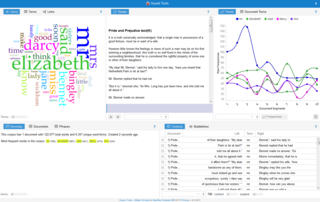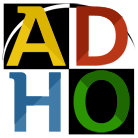The Association for Computing Machinery (ACM) is a US-based international learned society for computing. It was founded in 1947 and is the world's largest scientific and educational computing society. The ACM is a non-profit professional membership group, reporting nearly 110,000 student and professional members as of 2022. Its headquarters are in New York City.
Electronic publishing includes the digital publication of e-books, digital magazines, and the development of digital libraries and catalogues. It also includes the editing of books, journals, and magazines to be posted on a screen.
The year 1951 in science and technology involved some significant events, listed below.

Roberto Busa was an Italian Jesuit priest and one of the pioneers in the usage of computers for linguistic and literary analysis. He was the author of the Index Thomisticus, a complete lemmatization of the works of Saint Thomas Aquinas and of a few related authors.

Electronic literature or digital literature is a genre of literature encompassing works created exclusively on and for digital devices, such as computers, tablets, and mobile phones. A work of electronic literature can be defined as "a construction whose literary aesthetics emerge from computation", "work that could only exist in the space for which it was developed/written/coded—the digital space". This means that these writings cannot be easily printed, or cannot be printed at all, because elements crucial to the text are unable to be carried over onto a printed version.

Digital humanities (DH) is an area of scholarly activity at the intersection of computing or digital technologies and the disciplines of the humanities. It includes the systematic use of digital resources in the humanities, as well as the analysis of their application. DH can be defined as new ways of doing scholarship that involve collaborative, transdisciplinary, and computationally engaged research, teaching, and publishing. It brings digital tools and methods to the study of the humanities with the recognition that the printed word is no longer the main medium for knowledge production and distribution.
Humanist is an international electronic seminar on humanities computing and the digital humanities, in the form of a long-running electronic mailing list and its associated archive. The primary aim of Humanist is to provide a forum for discussion of intellectual, scholarly, pedagogical, and social issues and for exchange of information among members.
The Canadian Society for Digital Humanities is a Canadian scholarly association. Its full name is Society for Digital Humanities/Société canadienne des humanités numériques (CSDH-SCHN). The CSDH-SCHN was founded as the COCH/COSH or Consortium for Computers in the Humanities/ Consortium pour ordinateurs en sciences humaines in 1986. The organization changed its name to the Society for Digital Humanities/Société pour l'étude des médias interactifs (SDH/SEMI), but became CSDH-SCHN after 2007, when it was enfranchised by the Alliance of Digital Humanities Organizations.
Steven J DeRose is a computer scientist noted for his contributions to Computational Linguistics and to key standards related to document processing, mostly around ISO's Standard Generalized Markup Language (SGML) and W3C's Extensible Markup Language (XML).
The Digital Humanities conference is an academic conference for the field of digital humanities. It is hosted by Alliance of Digital Humanities Organizations and has been held annually since 1989.

The European Association for Digital Humanities (EADH), formerly known as the Association for Literary and Linguistic Computing (ALLC), is a digital humanities organisation founded in London in 1973. Its purpose is to promote the advancement of education in the digital humanities through the development and use of computational methods in research and teaching in the Humanities and related disciplines, especially literary and linguistic computing. In 2005, the Association joined the Alliance of Digital Humanities Organizations (ADHO).
The Association for Computers and the Humanities (ACH) is the primary international professional society for digital humanities. ACH was founded in 1978. According to the official website, the organization "support[s] and disseminate[s] research and cultivate[s] a vibrant professional community through conferences, publications, and outreach activities." ACH is based in the United States, and has an international membership. ACH is a founding member of the Alliance of Digital Humanities Organizations (ADHO), a co-originator of the Text Encoding Initiative, and a co-sponsor of an annual conference.
Feminist Digital Humanities is a more recent development in the field of Digital Humanities, a project incorporating digital and computational methods as part of its research methodology. Feminist Digital Humanities has risen partly because of recent criticism of the propensity of Digital Humanities to further patriarchal or hegemonic discourses in the Academy. Women are rapidly dominating social media in order to educate people about feminist growth and contributions. Research proves the rapid growth of Feminist Digital Humanities started during the post-feminism era around from the 1980s to 1990s. Such feminists’ works provides examples through the text technology, social conditions of literature and rhetorical analysis. Feminist Digital Humanities is aimed to identify and explore women's sense of writing as well as to prove widespread of women's work in most of the digital archive.
Willard McCarty is Professor of Humanities Computing in the Department of Digital Humanities at King's College London, England, where he is director of the doctoral programme in the department. He is a visiting professor in the Digital Humanities Research Group in the School of Humanities and Communication Arts at the University of Western Sydney, Australia. He is a Fellow of the Royal Anthropological Institute, London, and the editor of the Humanist Discussion Group established by him in 1987, dealing with humanities computing and the digital humanities.
Susan Hockey is an Emeritus Professor of Library and Information Studies at University College London. She has written about the history of digital humanities, the development of text analysis applications, electronic textual mark-up, teaching computing in the humanities, and the role of libraries in managing digital resources. In 2014, University College London created a Digital Humanities lecture series in her honour.
Ray Siemens is a professor in the faculty of humanities at the University of Victoria, British Columbia, Canada and former Canada Research Chair in Humanities Computing. Siemens is a recipient of the Antonio Zampolli Prize, presented by the Alliance of Digital Humanities Organizations (ADHO) for outstanding contributions to the field of Digital Humanities.
Lou Burnard is an internationally recognised expert in digital humanities, particularly in the area of text encoding and digital libraries. He was assistant director of Oxford University Computing Services (OUCS) from 2001 to September 2010, when he officially retired from OUCS. Before that, he was manager of the Humanities Computing Unit at OUCS for five years. He has worked in ICT support for research in the humanities since the 1990s. He was one of the founding editors of the Text Encoding Initiative (TEI) and continues to play an active part in its maintenance and development, as a consultant to the TEI Technical Council and as an elected TEI board member. He has played a key role in the establishment of many other activities and initiatives in this area, such as the UK Arts and Humanities Data Service and the British National Corpus, and has published and lectured widely. Since 2008 he has worked as a Member of the Conseil Scientifique for the CNRS-funded "Adonis" TGE.
Harold Short is Emeritus Professor of King's College London. He founded and directed the Centre for Computing in the Humanities until his retirement (2010). He was involved in the development with Willard McCarty of the world's first PhD programme in Digital Humanities (2005), and three MA programmes: Digital Humanities, Digital Culture and Society, and Digital Asset Management.

Lorna M. Hughes has been Professor in Digital Humanities at the University of Glasgow since 2015. From 2016 to 2019, she oversaw the redevelopment of the Information Studies subject area The re-launch was marked by an international symposium at the University of Glasgow in 2017.
Lori Emerson is an associate professor at the University of Colorado at Boulder and founder of the Media Archaeology Lab, a museum dedicated to obsolete technologies spanning from the late nineteenth century to the twenty-first century. She is known for her work in media archaeology, digital preservation, and digital archives.





